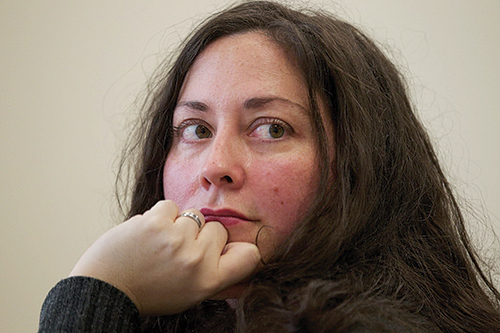Portland State English professor and novelist Leni Zumas was staring at a blinking cursor in an open Microsoft Word window. She was supposed to be writing an essay on punctuation, but she couldn’t find any words to punctuate. It was a familiar feeling: the dreaded specter of writer’s block hovering over her shoulder with a deadline approaching and pages to fill.
English professor’s work lauded in GOOD magazine

Portland State English professor and novelist Leni Zumas was staring at a blinking cursor in an open Microsoft Word window.
She was supposed to be writing an essay on punctuation, but she couldn’t find any words to punctuate. It was a familiar feeling: the dreaded specter of writer’s block hovering over her shoulder with a deadline approaching and pages to fill.
So Zumas decided to do something about it—and confronted her writer’s block head-on in her writing.
The resulting essay was published in GOOD magazine, which had already had a finger on Zumas’ fiction work. As a result, Zumas was named to their annual GOOD 100, a list of entrepreneurs and creatives selected by the magazine for their work driving change in their communities. Or, as GOOD puts it, a list composed of “trailblazers and truth-tellers, defenders and disrupters, inventors and inciters [who] all share one basic trait: They are DOers.”
GOOD is rolling out the list throughout spring on their website, good.is, but has yet to publish Zumas’ entry. Joining her are various entrepreneurs, educators and scientists who are working to found startups that bring healthy, sustainable food to low income areas or create venture capital firms intended to support creatives in the business industry who are having trouble securing traditional funding.
For her part, Zumas took the selection in stride. As a novelist celebrated for giving voice to characters cast out by society, a healthy dose of shoulder shrugging over national recognition only seems fitting.
“Although I’m honored to be on the list, I have to say lists and prizes and ‘best of’ categories are subjective,” Zumas said. “I don’t know how much change I drive, exactly, but I’m happy to be included.”
The acclaimed novelist has been teaching at PSU since 2011, and her fiction has been praised by sources from The New York Observer to writer and filmmaker Miranda July. Her latest novel, The Listeners, was a finalist for the 2013 Oregon Book Award.
But it’s not just celebrated prose that drew the eyes of GOOD to Zumas. Much of her work as a faculty member in the creative writing master’s program at PSU is spent teaching students not only how to craft narrative and character arcs but also just what to do when that blinking cursor plagues them.
In her essay published in GOOD, Zumas spoke to the way writers often get stuck thinking about the meaning of the words they are trying to use rather than the words themselves. Sometimes, she explained, writers ought to do the opposite of what they instinctually think they need to do.
“Too often we labor under the belief that thought comes before speech—that a writer chooses a particular message, meaning or sensation before she starts to write—yet this is not necessarily the case,” Zumas wrote.
It might sound abstract to some, but it is precisely the kind of instruction creative writing students seek out from faculty such as Zumas, lessons that will be mirrored in classes such as the upcoming “Constraint-Based Writing” course she will co-run with PSU poetry professor John Beer.
But, ultimately, magazine spot and all, Zumas’ work shines as a beacon not only for PSU’s young creative writing program but for the entire school itself, an advantage of a faculty plugged into the greater Portland community that surrounds it.
“It’s really exciting to know that the professors here are published authors,” said Chelsea Lobey, a PSU English undergraduate looking into returning to PSU for her graduate studies. “Knowing that the faculty here are the same people I can find on the shelves at Powell’s [Books] or out in the real world is one of the main reasons I’m thinking about staying
at PSU.”





